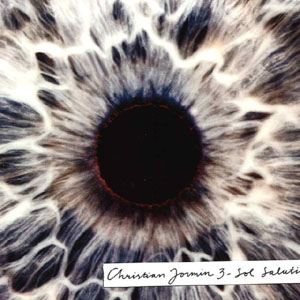 The Christian Jormin 3 is a jazz trio based in Sweden, comprised of Christian Jormin, piano and percussion; Mattias Gröroos, bass; and Magnus Boqvist, drums. Sol Salutis is, indeed, jazz, and sometimes subject to that cold intellectualism that I often find off-putting. This particular collection, however, has many redeeming qualities.
The Christian Jormin 3 is a jazz trio based in Sweden, comprised of Christian Jormin, piano and percussion; Mattias Gröroos, bass; and Magnus Boqvist, drums. Sol Salutis is, indeed, jazz, and sometimes subject to that cold intellectualism that I often find off-putting. This particular collection, however, has many redeeming qualities.
The trio’s first offering, “Det tänds et ljus” (“A Light Has Been Lit”) begins as an upbeat, lively but low-key drum solo that is quietly invaded by Jormin’s piano, which in turn picks up the enthusiasm from the drums; it really is a showcase for Boqvist. Of particular note on this collection (all Jormin’s compositions) is “Det finns en väg” (“There Is A Way”), which begins with bowed bass improvisations around a Swedish hymn that shows all the lessons learned from not only jazz, but contemporary art music as well. (Indeed, it is not until almost four and a half minutes into the piece that there is a recognizable statement of a theme, subject to further variations on the piano.) “Vandkors” (“Turnstyle”) is a piece that pits spare, enigmatic groups of minor chords with sharp accents on the piano against fluid glissandi that flirt with the jazz idiom, all over some fascinating counterpoint on the drums – elliptical and thought-provoking. “Pärlor Skõna” is a hymn that goes through a transformation that its composer most likely never dreamed of. Sharp work on the drums leads off over an adventurous bass line. A wonderful illustration of what jazz can be. “Sol Salutis” is another strong percussion solo, by Jormin, and again partakes of the mysterious, elliptical quality of “Vandkors“. “M,” originally composed for a dance performance, becomes a fluent, melodic meditation, and a strong finish to the collection.
You, gentle reader, are I think due a disclaimer at this point: my reaction to much jazz, particularly of the “cool” variety, is that it is prone to a kind of inwardly directed intellectualism that I find more than a little cold. It becomes very much a self-referential exercise. The passion is there, one can see it, and at its best it draws the audience in, but it makes little effort to bridge that gap between performer and listener otherwise. Improvisation becomes subject to the same degree of ornamentation that one might find in Mozart or Rossini (in whose works I think the intellectualism is a matter of form rather than substance). I most often feel like a specatator rather than a participant in the experience, and quite frankly, I’d like to be met at least halfway.
It is therefore no surprise that I find the least jazz-like tracks on this disc the most interesting. It seems as though when the group falls back firmly into the jazz idiom, the music begins to veer dangerously close to cliché, and when they start moving into an art music idiom, they do some wonderful things. This doesn’t alter that fact that the level of musicianship is very high throughout; this is very intelligent and engaging offering, in which the Christian Jormin 3 offers some outstanding performances.
(Footprint Records, 2004)
